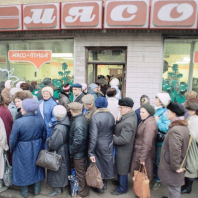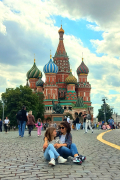Хлебников о Деле Ходорковского
 agasfer — 09.03.2011
Нашел неожиданного единомышленника, который тоже считает, что
"лучше такая справедливость, чем никакой": им оказался покойный Пол
Хлебников.
agasfer — 09.03.2011
Нашел неожиданного единомышленника, который тоже считает, что
"лучше такая справедливость, чем никакой": им оказался покойный Пол
Хлебников.С этой его статьей в Уоллстрит Джорнал от 17 ноября 2003 г настоящая мистика. Хотя статья обильно цитируется, напр., в LONDONGЯADе (откуда я и узнал о ее существовании), и цитаты их нее легко находятся в сети, полный текст я смог найти лишь в комментарии некоего Степашки на Эхе Москвы, каковой Степашка утверждает, что с сайта журнала она исчезла. Я копирую текст статьи под катом, а здесь отмечу, что Хлебников для беглых олигархов был чрезвычайно неудобной фигурой, т к разрушал их имидж мученников на Западе. Вот
By PAUL KLEBNIKOV
Western newspapers reacted in alarm to the recent arrest of Russia's richest businessman, Mikhail Khodorkovsky. The spectacle certainly didn't help Russia's image as a civilized place to do business. Newspapers warned about the return of Soviet-style despotism, while opinion pages even raised the specter of Nazi Germany.
Such wild speculation and hyperbole are in marked contrast with the response of those more familiar with the situation. The State Department confined itself to a tactful warning to Kremlin hard-liners not to take the attack on Big Business too far. Mr. Khodorkovsky's fellow tycoons have been conspicuous in not standing up for him. Russian newspapers (for the most part owned by those very tycoons) have excoriated the Putin administration for giving too much power to ex-KGB men (the so-called siloviki), but they have refrained from the more fantastical scenarios dangled by their Western colleagues.
That's because they have a better understanding of what's happening -- or not happening -- in today's Russia. Mr. Khodorkovsky's arrest is not the start of a campaign to "get the rich." It does not herald the emergence of a totalitarian dictatorship or of Soviet-style nationalization of the "commanding heights" of the economy. Neither is this a case of a man being framed for fictitious crimes in the manner of the Stalinist show trials. On the contrary, the problem is that so many other top Russian businessmen could be accused of the same crimes allegedly perpetrated by Mr. Khodorkovsky.
So what is going on in Russia? We are witnessing the final death agony of the kleptocracy that was Boris Yeltsin's Russia. Nothing illustrates the flaws of Yeltsin-era privatization better than the infamous "loans-for-shares" auctions of 1995-97 that provided Mr. Khodorkovsky with his fortune. In the fall of 1995, his Menatep Bank was given the right to conduct an auction for a 45% stake in the state-owned oil giant Yukos. Once foreign investors and rival Russian bidders had been disqualified, Mr. Khodorkovsky and his five partners ended up with a 78% stake in Yukos -- for which they paid $309 million. How absurd was this sum? In the summer of '97, two months after this deal was finalized, Yukos was trading on the Russian stock exchange at a market capitalization of $6 billion. (Today its market cap is $24 billion.)
When you buy state assets in such a dubious backroom deal and at such a steep discount to market, chances are your property rights will never be truly secure. You will always be regarded by the population as a crook and by the government as more of a custodian of state assets than an owner. Imagine for a moment if Margaret Thatcher's privatization of British industry in the '80s had been similarly flawed. Imagine if state-owned British Petroleum had been sold off in 1987 not for $40 billion, but for $400 million -- and with 78% of the company going to a close friend of the PM's son. Would future British governments let such a result stand? And if they did, what kind of a foundation would that be for the future of the British economy?
That's why Russia's business magnates seem so calm about Mr. Khodorkovsky's arrest. They understand that if the economy is to continue growing vigorously, it needs to be based on more solid foundations than the handful of oligarch empires created by the auctions of 1995-97. With every year, these new, stronger foundations are being laid. Already, of the 10 most widely traded Russian equities, six are companies that didn't participate in the loans-for-shares auctions. Two of these were built from scratch.
It's been 16 years already that Russia has been engaged in the tortuous construction of democracy, a market economy and civil society on the ruins of communism. These are things that don't just appear as a result of a plebiscite, a government decree or a new constitution. This is an evolutionary process that takes time. The Khodorkovsky affair is a milestone in that process. Of course it's unfair that the tycoon was singled out. His arrest certainly looks like a case of selective justice. But this is still better than no application of justice at all. During the Yeltsin era, well-connected businessmen could routinely embezzle millions from the state treasury or even organize the murder of rivals -- all without the prosecutors making a squeak. The result was relentless economic decline and the collapse of the ruble in 1998.
Imagine yourself one of Russia's tycoons. What conclusions are you going to draw from the Khodorkovsky affair? What do you have to do to avoid joining him in prison? Clearly, you're going to make sure you stay on the right side of the Russian president or, better yet, stay out of politics altogether. But you will also redouble efforts not to violate the law, not to engage in the kind of get-rich-quick schemes that marked the Yeltsin era -- so you don't present a juicy target for prosecutors and political crusaders. Out of such considerations is a law-abiding society built.
The Khodorkovsky arrest does not signify the triumph of the rule of law. The brutal way in which the detention was handled shows how far Russia has to go before it develops a civilized law-enforcement system. And we'll have to see how Vladimir Putin's men handle the case going forward (my hunch is that it is going to get uglier before it gets better). But I think we'll look back on this event and conclude that it actually strengthened the foundations of Russian property rights, and the Russian market.
Mr. Klebnikov, a senior editor at Forbes, is author of "Godfather of the Kremlin: Boris Berezovsky and the Looting of Russia" (Harcourt, 2000).
АПДТ: Статья нашлась здесь, спасибо
|
|
</> |

 Аппаратная замена масла в автомобиле: преимущества вакуумной технологии над традиционными методами
Аппаратная замена масла в автомобиле: преимущества вакуумной технологии над традиционными методами  В Мурманске в этот раз мы снимали квартиру в одном из так
В Мурманске в этот раз мы снимали квартиру в одном из так  Аминь!
Аминь!  После боя
После боя  Любимая высотка на
Любимая высотка на  жёлтый букет
жёлтый букет  Еда — это не главное
Еда — это не главное  Стихотворные ассоциации в Миндене
Стихотворные ассоциации в Миндене  Три ха ха
Три ха ха 



